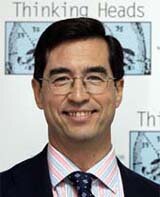Two Leadership Essentials in Times of Change and Uncertainty
 It has almost become cliché to say that we are living in times of uncertainty. Our global economic situation is unstable and highly complex, weather has become more extreme and the speed of change leaves many of us breathless.Life has always been uncertain, but it is more obvious now. Uncertainty and change arouse fear and anxiety in most of us, whether we are aware if it or not, and when we are fearful our stress level increases. Long-term stress creates dis-ease.As a leader, you know you can use the power of communication to influence the people you lead. But did you know that through your communication, you can improve their health, reduce their stress and increase their vitality and energy?Do you want to know how? Then continue reading.There is a field of study called Psychoneuroimmunology (PNI) that looks at the impact of our emotions working on our body. As it turns out, the immune system and the brain talk to each other.For example, research shows that when doctors truly care about patients, patients perceive it (consciously and subconsciously). When they feel cared for and cared about, people who are ill get rid of infections faster and their wounds heal more quickly. People feel vulnerable when they are ill. They are uncertain, scared and are trying to navigate complex systems to receive appropriate care. While leaders aren’t MDs dealing with patients, all organizations are dealing with uncertainty, complexity and rapid change, and that means leaders need to help people in their organization cope.What are the two things leaders must do to effectively lead during times of uncertainty, complexity and change?
It has almost become cliché to say that we are living in times of uncertainty. Our global economic situation is unstable and highly complex, weather has become more extreme and the speed of change leaves many of us breathless.Life has always been uncertain, but it is more obvious now. Uncertainty and change arouse fear and anxiety in most of us, whether we are aware if it or not, and when we are fearful our stress level increases. Long-term stress creates dis-ease.As a leader, you know you can use the power of communication to influence the people you lead. But did you know that through your communication, you can improve their health, reduce their stress and increase their vitality and energy?Do you want to know how? Then continue reading.There is a field of study called Psychoneuroimmunology (PNI) that looks at the impact of our emotions working on our body. As it turns out, the immune system and the brain talk to each other.For example, research shows that when doctors truly care about patients, patients perceive it (consciously and subconsciously). When they feel cared for and cared about, people who are ill get rid of infections faster and their wounds heal more quickly. People feel vulnerable when they are ill. They are uncertain, scared and are trying to navigate complex systems to receive appropriate care. While leaders aren’t MDs dealing with patients, all organizations are dealing with uncertainty, complexity and rapid change, and that means leaders need to help people in their organization cope.What are the two things leaders must do to effectively lead during times of uncertainty, complexity and change?
- Build Trust
- Build Confidence and Offer Hope
Surprised? Let’s unpack these two things.Trust—Here we are talking about two kinds of trust:
- Technical trust. Do I trust that you know what you're doing? Do you have the technical skills and background - the experience to lead us?
- Trust that you care about my wellbeing. Do I trust that you care about me as a person-that my wellbeing matters to you? Do I trust that you truly care about my needs? How approachable are you? Are you understanding?
Trust is crucial in a time of uncertainty and change and when dealing with complexity. Why? When we treat people with understanding and caring, we build an emotional bond. This releases oxytocin -- an essential hormone for controlling fear. Stress decreases, blood pressure lowers and the immune system becomes stronger.Build Confidence and Offer Hope—It is essential for leaders to inspire confidence that together we have the capacities and abilities to surmount obstacles and successfully take on challenges; that we have the resources and talents; that we can do it and we will succeed. When leaders build confidence, it grows connections in people’s brains.How does this work? When people feel they can overcome obstacles and whatever is thrown their way, you see changes in the blood flow to the brain. When there is increased blood flow inside the brain, the neurons function more effectively. They get more glucose and oxygen. These neurons start connecting differently.New neurons are also created - stem cells potentiate and become neurons. Therefore, when we increase trust during uncertainty and change, we increase neuroplasticity—the brain changes. New neurons are essential to control our fear and to enable rapid learning. Increasing trust decreases uncertainty.Imagine for a moment being lead by someone who did these two things. What would it be like to be lead by someone who believed in you—your capacities and talents; someone who you felt cared about your wellbeing ... who understood you?People need to know they and the organization are in good, capable hands and that you care about them, first as human beings--not just as a means to meet business and financial goals.This shift in mindset and behavior is to one of building trust and away from inciting fear; to help people in your organization reach beyond what they believe they are capable of and to give them hope about the future. The Leadershift is to approach people with an empathic heart and a sense of awe, wonder, and humility about what it means to be human.__________________________________________________________________ This blog post was inspired by Mario Alonso Puig, a surgeon and fellow at Harvard Medical School. As serendipity would have it, I was sent a link to a video by Dr. Puig where he describes the healing power that comes from the bond developed between doctor and patient.Several years ago, I co-facilitated a course called Patient Physician Interaction for all incoming MDs at a major healthcare organization. Two of the key components we taught were, how to develop rapport and demonstrate empathy. We know that patient visits run more quickly and smoothly and that greater patient compliance results when there is a connection between the MD or care provider and the patient. The patient feels heard and understood and the MD demonstrates listening and caring. What we didn't teach was that the bond between MD and patient actually has healing powers.
This blog post was inspired by Mario Alonso Puig, a surgeon and fellow at Harvard Medical School. As serendipity would have it, I was sent a link to a video by Dr. Puig where he describes the healing power that comes from the bond developed between doctor and patient.Several years ago, I co-facilitated a course called Patient Physician Interaction for all incoming MDs at a major healthcare organization. Two of the key components we taught were, how to develop rapport and demonstrate empathy. We know that patient visits run more quickly and smoothly and that greater patient compliance results when there is a connection between the MD or care provider and the patient. The patient feels heard and understood and the MD demonstrates listening and caring. What we didn't teach was that the bond between MD and patient actually has healing powers.

